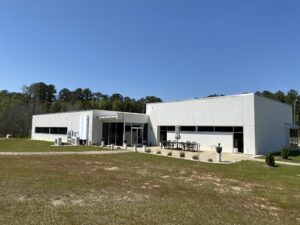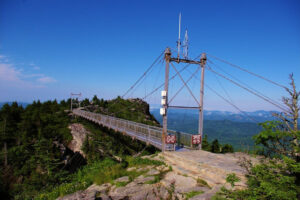About ECONet
What is the ECONET?
The North Carolina Environment and Climate Observing Network (ECONet) currently consists of 45, 10-meter (33-foot) tall aluminum towers across 35 counties in North Carolina and one county in South Carolina. The ECONet was developed in cooperation with state and federal agencies in order to record weather and climate observations for a variety of applications.

ECONet stations measure a variety of atmospheric and soil parameters. These observations are made on 1 minute intervals and relayed back to our office in Raleigh, NC every 5 minutes. The majority of our stations are powered via solar power that powers a deep cycle marine battery. This enables our stations to be in remote locations where power is not easily accessible.
Click on the links below for more information about:
- Technical Overview of the NC ECONet (redirects to journal article)
- ECONet research and applications (overview flyer)
- Establishing a new ECONet station (overview flyer)
- ECONet 2022-2027 strategic plan (overview flyer)
- History of the ECONet (redirects to history page)
What does the ECONET measure?
Atmospheric and soil parameters measured include:
- Air Temperature (2 meters)
- Relative Humidity (2 meters)
- Barometric Pressure (2 meters)
- Wind Speed and Direction (3 levels — 2, 6, and 10 meters)
- Precipitation (2 levels — 1 meter and 2 meters)
- Total Solar Radiation (2 meters)
- Photosynthetically Active Radiation (2 meters)
- Leaf Wetness (0.6 meters)
- Soil Moisture (20 centimeters below the surface)
- Soil Temperature (10 centimeters below the surface)
- Black Globe Temperature (2 meters)
- Air Temperature (9 meters)
What is ECONET data used for?
Data from the ECONet is sent back to the North Carolina State Climate Office, which combines station data maintained by the National Weather Service, Federal Aviation Administration, and US Natural Resource Conservation Service. Each ECONet station is designed to international standards and provides data that is analyzed and archived by the State Climate Office. Data from these 44 ECONet stations are provided to government agencies to improve severe weather prediction and response, weather forecasts, energy planning, and natural resource management. Past weather and climate data is available to the public for a variety of uses.
ECONet stations act as an extension of the North Carolina State Climate Office, as they are constantly monitored and run through quality control processes to ensure accurate and valid data. This vast collection of data is valuable to many different forms of interdisciplinary research and ECONet towers themselves can be used to carry out fieldwork and conduct agricultural or meteorological experimentation. In its full capacity, the ECONet would be a state-of-the-art network of more than 100 weather and environmental observing stations across North Carolina. While the ECONet currently provides assistance to a wide range of interests, fulfilling the goal of having one automated weather station in each North Carolina county would further improve its benefits and utility.
ECONet Tower Tour
What is the ECOExt?
The ECONet Extended network, or ECOExt, is a collection of stations that the State Climate Office manages in collaboration with local and regional partners. The State Climate Office offers maintenance expertise and enables public access to ECOExt station data. ECOExt stations compliment the ECONet, but do not have the same sensor suite as ECONet stations.

Center for Energy Education (C4EE)
Site ID: C4EE
Roanoke Rapids, NC in Halifax county
The Center for Energy Education (C4EE) in Roanoke Rapids, NC. (Image from NC State Climate Office)
Photo Coming Soon
Eastern Band of the Cherokee Indian Tower (EBCI)
Site ID: EBCI
Charokee, NC in Swain County
Photo Coming Soon

Grandfather Mountain
Site ID: GRANDFATHR
Linville, NC in Avery County
The Grandfather Mountain Mile High Swinging Bridge, with weather instruments mounted on the north side. (Image from Romantic Asheville)

NC State Campus Station
Site ID: CAMP
Raleigh, NC in Wake County
Jordan Hall on NC State University’s Central Campus. Weather station is located on the roof of the building. (Image from NCSU facilities)